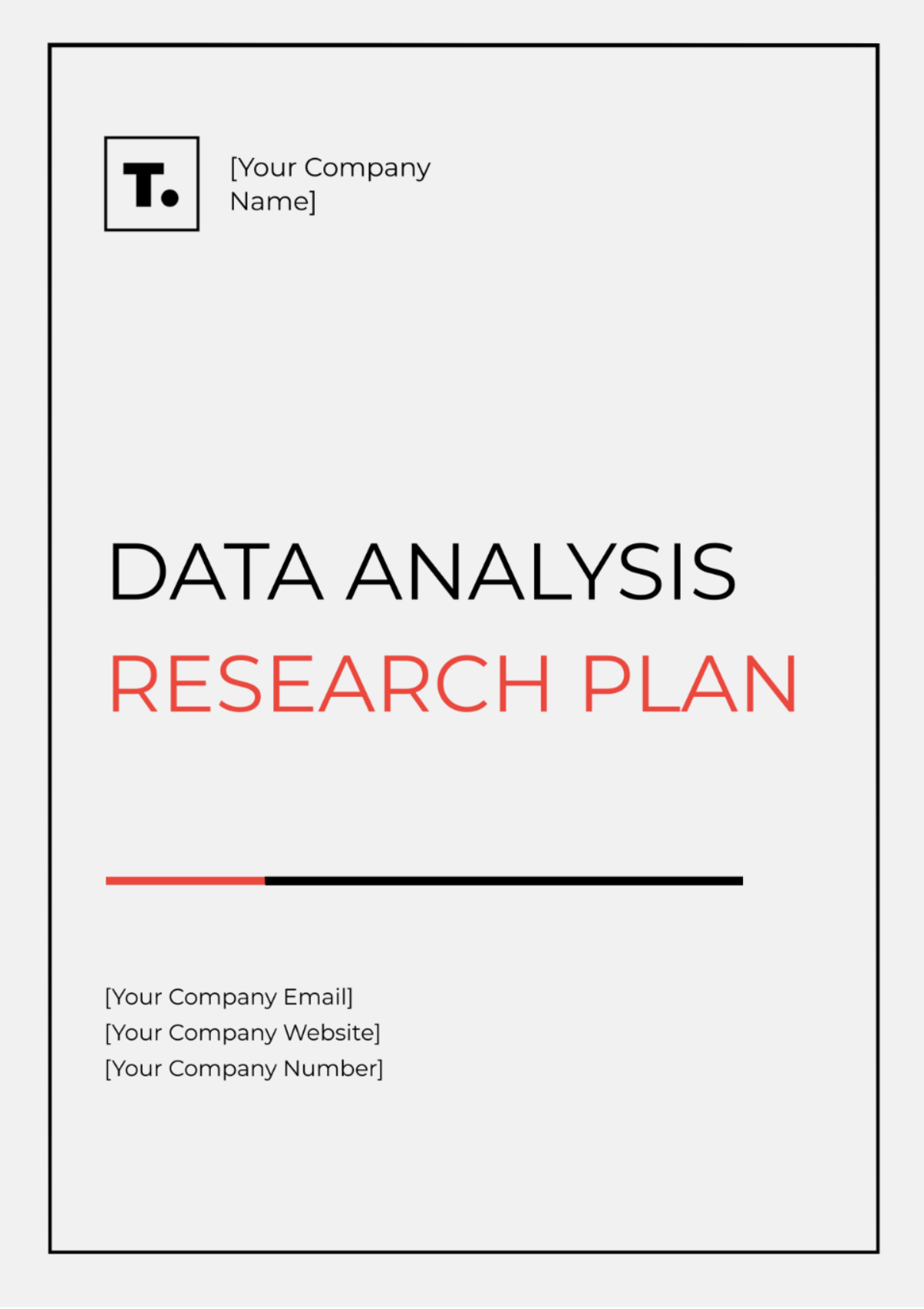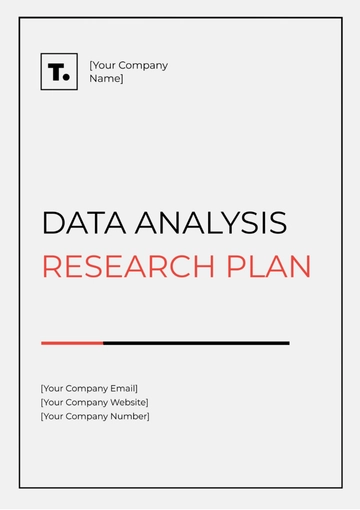Free Data Analysis Research Plan

I. Introduction
In contemporary educational settings, understanding the nuances of student performance is paramount for optimizing learning outcomes. This research endeavors to delve into a comprehensive dataset, meticulously curated from the academic records of students within [INSTITUTION NAME], to unravel the intricate interplay of factors shaping student achievement. By scrutinizing various dimensions of student performance alongside extracurricular engagements, this endeavor aspires to furnish educators and policymakers with actionable insights to enhance educational practices and foster student success.
II. Research Objectives
Exploring Demographic Dynamics: Scrutinize the influence of demographic factors such as age, gender, and socioeconomic status on academic performance, aiming to unearth disparities and highlight areas for targeted interventions.
Extricating Extracurricular Effects: Investigate the impact of extracurricular activities on academic attainment, aiming to discern whether participation correlates with enhanced scholastic outcomes or potentially exerts diversely significant effects.
Evaluating Educational Efficacy: Assess the efficacy of pedagogical methodologies and classroom environments in facilitating learning, aiming to distill best practices conducive to fostering student engagement and achievement.
III. Data Sources
The dataset comprises a meticulously curated amalgamation of anonymized student records sourced from [INSTITUTION NAME]'s academic archives, encompassing a diverse array of scholastic metrics, demographic variables, and extracurricular involvements.
Data procurement was meticulously executed through multifaceted channels, including student surveys, academic transcripts, and institutional databases, ensuring comprehensive coverage and fidelity of the dataset.
IV. Data Preprocessing
Data Refinement: Impute missing values, rectify discrepancies, and sanitize the dataset to ensure its integrity and coherence.
Outlier Management: Employ robust statistical methodologies to identify and mitigate outliers, ensuring the robustness and reliability of subsequent analyses.
V. Data Analysis Methods
Statistical Elicitation: Harness the power of inferential statistics, regression analyses, and correlation assessments to unravel the intricate relationships enshrined within the dataset.
Machine Learning Enrichment: Leverage advanced machine learning algorithms to undertake predictive modeling and unsupervised learning techniques, unveiling latent patterns and clusters pervading the dataset.
VI. Data Analysis Plan
Analytical Arsenal: Employ cutting-edge statistical software suites such as R or Python, empowering rigorous exploratory data analyses and sophisticated modeling endeavors.
Iterative Investigation: Adhere to a cyclical analytical framework, encompassing exploratory data analysis, hypothesis testing, and model refinement, fostering iterative refinement and convergence toward actionable insights.
VII. Timeline
Phase | Duration |
|---|---|
Data Refinement and Exploration | June - July 2050 |
Statistical Analyses and Modeling | August - September 2050 |
Report Composition and Presentation Preparation | October - November 2050 |
VIII. Expected Outcomes
Outcome | Description |
|---|---|
Holistic Insight | Garner holistic insights into the multifaceted determinants underpinning student performance, furnishing stakeholders with a nuanced understanding of educational dynamics. |
Policy Prescriptions | Propose evidence-based policy recommendations aimed at mitigating educational disparities, optimizing pedagogical efficacy, and cultivating an inclusive learning environment. |
Pedagogical Paradigm Shifts | Galvanize pedagogical paradigm shifts by elucidating efficacious instructional strategies and curricular interventions fostering enhanced student engagement and achievement. |
IX. Conclusion
This meticulously delineated Data Analysis Research Plan embodies a systematic and holistic approach toward unraveling the labyrinthine dynamics governing student performance, underscoring the transformative potential of data-driven insights in fostering educational excellence and nurturing the intellectual capital of tomorrow's leaders.
- 100% Customizable, free editor
- Access 1 Million+ Templates, photo’s & graphics
- Download or share as a template
- Click and replace photos, graphics, text, backgrounds
- Resize, crop, AI write & more
- Access advanced editor
Enhance your data analysis endeavors with Template.net's Data Analysis Research Plan Template. This customizable and editable template simplifies the process, ensuring precision and efficiency in your research projects. Crafted with expertise, it empowers you to streamline your data analysis methodologies effortlessly. Utilize our AI Editor Tool to tailor the template to your specific needs.
You may also like
- Finance Plan
- Construction Plan
- Sales Plan
- Development Plan
- Career Plan
- Budget Plan
- HR Plan
- Education Plan
- Transition Plan
- Work Plan
- Training Plan
- Communication Plan
- Operation Plan
- Health And Safety Plan
- Strategy Plan
- Professional Development Plan
- Advertising Plan
- Risk Management Plan
- Restaurant Plan
- School Plan
- Nursing Home Patient Care Plan
- Nursing Care Plan
- Plan Event
- Startup Plan
- Social Media Plan
- Staffing Plan
- Annual Plan
- Content Plan
- Payment Plan
- Implementation Plan
- Hotel Plan
- Workout Plan
- Accounting Plan
- Campaign Plan
- Essay Plan
- 30 60 90 Day Plan
- Research Plan
- Recruitment Plan
- 90 Day Plan
- Quarterly Plan
- Emergency Plan
- 5 Year Plan
- Gym Plan
- Personal Plan
- IT and Software Plan
- Treatment Plan
- Real Estate Plan
- Law Firm Plan
- Healthcare Plan
- Improvement Plan
- Media Plan
- 5 Year Business Plan
- Learning Plan
- Marketing Campaign Plan
- Travel Agency Plan
- Cleaning Services Plan
- Interior Design Plan
- Performance Plan
- PR Plan
- Birth Plan
- Life Plan
- SEO Plan
- Disaster Recovery Plan
- Continuity Plan
- Launch Plan
- Legal Plan
- Behavior Plan
- Performance Improvement Plan
- Salon Plan
- Security Plan
- Security Management Plan
- Employee Development Plan
- Quality Plan
- Service Improvement Plan
- Growth Plan
- Incident Response Plan
- Basketball Plan
- Emergency Action Plan
- Product Launch Plan
- Spa Plan
- Employee Training Plan
- Data Analysis Plan
- Employee Action Plan
- Territory Plan
- Audit Plan
- Classroom Plan
- Activity Plan
- Parenting Plan
- Care Plan
- Project Execution Plan
- Exercise Plan
- Internship Plan
- Software Development Plan
- Continuous Improvement Plan
- Leave Plan
- 90 Day Sales Plan
- Advertising Agency Plan
- Employee Transition Plan
- Smart Action Plan
- Workplace Safety Plan
- Behavior Change Plan
- Contingency Plan
- Continuity of Operations Plan
- Health Plan
- Quality Control Plan
- Self Plan
- Sports Development Plan
- Change Management Plan
- Ecommerce Plan
- Personal Financial Plan
- Process Improvement Plan
- 30-60-90 Day Sales Plan
- Crisis Management Plan
- Engagement Plan
- Execution Plan
- Pandemic Plan
- Quality Assurance Plan
- Service Continuity Plan
- Agile Project Plan
- Fundraising Plan
- Job Transition Plan
- Asset Maintenance Plan
- Maintenance Plan
- Software Test Plan
- Staff Training and Development Plan
- 3 Year Plan
- Brand Activation Plan
- Release Plan
- Resource Plan
- Risk Mitigation Plan
- Teacher Plan
- 30 60 90 Day Plan for New Manager
- Food Safety Plan
- Food Truck Plan
- Hiring Plan
- Quality Management Plan
- Wellness Plan
- Behavior Intervention Plan
- Bonus Plan
- Investment Plan
- Maternity Leave Plan
- Pandemic Response Plan
- Succession Planning
- Coaching Plan
- Configuration Management Plan
- Remote Work Plan
- Self Care Plan
- Teaching Plan
- 100-Day Plan
- HACCP Plan
- Student Plan
- Sustainability Plan
- 30 60 90 Day Plan for Interview
- Access Plan
- Site Specific Safety Plan
